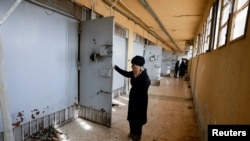As Syrians danced in the streets over President Bashar al-Assad's fall from power, Anwar Etnesh drove his car into the dense traffic clogging the route from his hometown Daraa north to Damascus.
Hordes of Syrians like Etnesh were heading to Syria's capital to celebrate the end of the Assad family's rule. But Etnesh was on a mission to find his 55-year-old cousin, whom Assad soldiers arrested in Daraa 13 years ago during anti-government protests. He was never seen or heard from again.
Since Assad fled to Russia, according to Russian state media, the militias who overthrew his rule, led by former al-Qaida affiliate Hayat Tahrir al-Sham, or HTS, have been freeing thousands of prisoners.
"I don't know if he's alive," Etnesh relayed to VOA Mandarin by video call from Damascus. "I went to the mosque at 7 a.m. and then have been from prison to prison to prison searching. Nine prisons so far. I don't even know what prison he's in."
He is one of the estimated nearly 137,000 Syrians whom rights groups say disappeared into military prisons during the civil war.
The Britain-based Syrian Network for Human Rights says Syrian government interrogators have tortured more than 15,000 prisoners to death since 2011.
'What was our crime?'
Basheer Mansour, who spoke to VOA Mandarin by phone messaging application and email, is one of the lucky prisoners who survived.
He said that in 2011, regime soldiers opened fire on him and his university friends as they attempted to deliver critical medicine and food to Daraa residents living under a government siege.
Mansour said two friends were shot to death beside him. He and other survivors were forced into trucks, blindfolded, beaten and corralled into a small toilet space where he said they were held captive and tortured with brutal beatings and sleep deprivation that left some prisoners dead.
"They used an electric rod in my abdominal area and whipped my head," Mansour said. "They removed fingernails and burned my body with cigarettes. I wished I would die just to get rid of the torment. They did many things I cannot to this day talk about. What was our crime?"
The most extreme torture, said Mansour, was inflicted by hospital staff in a Damascus-area military prison, where he was admitted after suffering severe wounds inflicted during torture. He said he was blindfolded and handcuffed throughout his 10-day hospital stay.
"The last day at the hospital they removed the handcuffs from my hands and feet and asked me to move my legs," Mansour recalled. "I tried to move my legs and hands but couldn't. I couldn't move a single part of my body. I started to cry … and begged them to kill me because I did not want to live paralyzed. They took everything from me and stole my life and my future."
Soon after, his captors phoned his father to come get him, he said.
'Now we can go back'
Today Mansour uses a wheelchair and lives in North Carolina, where he works at the airport and studies computer programming. He is closely following events unfolding in Syria.
"My family is scattered around the world," he told VOA Mandarin. "Some are in Germany, some in Holland, some in France and in Kuwait. I haven't seen them for 11 years. I would love to go back to Syria just to gather with them and see them. I'm happy the regime is gone. Now we can go back to Syria."
But returning to Syria may not be easy.
The conglomerate of militias led by Hayat Tahrir al-Sham on Tuesday announced an interim prime minister but have not yet made public their detailed plans for governance of Syria.
Meanwhile, inside the country, locals — including those like Etnesh who are still looking for imprisoned relatives — are enjoying the new reality — a Syria without rule by Assad.
"I'm in shock. This is a dream. The regime is over. There aren't any Syrian troops anywhere. People are crying, they're happy. … It's disbelief," Etnesh said. "And we're all waiting for news of relatives. Most Syrians have someone they know in prison."
As of midday Monday in Damascus, Etnesh had not received any word on his cousin. He told VOA Mandarin he'll search for another week before returning home to Daraa.





Forum